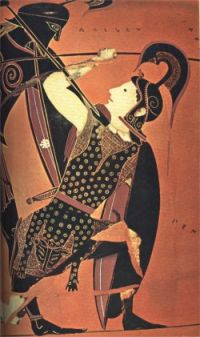Readers' Guide: The Iliad by Homer, translated by Stanley Lombardo
The Iliad
Category: FICTION, EPIC POETRY
Guide Created By: Ginny, JoanK, PatH
Discussion Leader: Ginny
Read our archived discussion of this book
Guide Description
 A 3,000 year old story in a fresh new translation with surprising insights for the new Millennium.
A 3,000 year old story in a fresh new translation with surprising insights for the new Millennium.
Background Information
We are delighted and honored to have both an exclusive interview with Dr. Stanley Lombardo, and comments on the philosophy in the Iliad from Dr. Mark Stone, Professor of Philosophy, whose course suggested this discussion.Plot Synopsis
Surprisingly full of modern truths and debatable issues, Dr. Lombardo's extremely readable translation of Homer's 3,000 year old epic poem allows the reader to fully experience a miraculous age old story. Homer pulls out all the stops, illuminating the rationales underlying power struggles, relationships, revenge, rage, love, warfare, and especially what it means to be fully human in any era. It is one of the greatest books ever written.Bibliography of the Author's Works
A Selected Bibliography of Books Translated or Edited by Stanley Lombardo:
- Odyssey by Homer
- The Aeneid by Virgil
- Iliad by Homer
- Tao Te Ching by Lao-Tzu, translated by Stanley Lombardo and Stephen Adiss
- Poems and Fragments by Sappho
- Callimachus: Hymns, Epigrams, Select Fragments (Hardcover) by Callimachus
- The Essential Homer: Selections from the Iliad and the Odyssey by Homer
- Parmenides and Empedocles
- Protagoras by Plato
Collateral Material
Map of the Iliad with Characters ~ Click to enlarge.Critical Reviews Reviews
Reviews for Dr. Lombardo’s translation are dazzling: "The most daring, rapid and colloquial translation of Homer’s Iliad that I know"—Richard Janko, Professor of Greek, University College, LondonQuestions
Sample Discussion Questions
For The Iliad
Translated by Stanley Lombardo
Below is one set of 16 sets of questions; click on the links below the questions to see the other pages of questions and comments.
SAMPLE Questions for Book 2: Reverse Psychology and a Cast of Thousands

- What two things are surprising about the behavior of Zeus in Book 2?
The usual drill-order them to beat a retreat in their ships.
It's up to each one of you to persuade them to stay." (78-80)
..The very god who revealed him turned him to stone.
An unmistakable portent from Zeus, son of Cronus....This great portent is a message from Zeus." (342-350)
That hum from a hollow rock in an endless line
And fly in clusters over flowers in spring,
Grouping themselves in aerial throngs." (92-95)
What literary device is this an example of? What role does it play in The Iliad, what is its purpose?
His house half-built. A Dardanian killed him..." ( 810-811)
- At the end of Book 2, we are prepared for battle. "Athena sweeps among the men...stiffening their hearts, so that for each of them to die in battle was sweeter than going home." (183). We will want to watch and see if we can determine what Homer's definition of what it means to be a human being is revealed and how it is revealed.
- Philosophy in the Iliad: The Dialectic between two ways of resolving conflict: Force and Words
- Using the idea of this dynamic, how many other examples can we find in The Iliad which show how Force abandons Words and how Words abandon Force?
- Which commander shows more respect for others as ends in themselves rather than as means to an end, Achilles or Agamemnon?
- Is it possible to wage war or command troops in battle without using others as an end?
- How will Achilles or Agamemnon, or Hector or Priam be able to keep their humanity in the inferno to come? Will the gods help or hurt? These are some of the issues we will want to watch, a million things going on at once! How can you lead men into battle and consider them as an end and not a means to an end? Which commander comes closest to this goal? Give us your thoughts!
Links to All Questions
Background
Iliad
Book 1: Rage!
Book 2: Reverse Psychology and a Cast of Thousands
Books 3 & 4
Books 5 & 6
Philosophical Issues in the Iliad
Themes and Terms
Books 7 & 8
Book 9
Book 10
Book 11
Books 12-13
Books 14-15
Book 16
Books 17-20
Quotes by our Participants
- "I think the Iliad is absolutely one of the most enjoyable things I've ever read. When I finish it, I feel I should start over again at the beginning in case I missed anything. "---Shasta
- "I wanted to read the Iliad because I thought I 'should' as an educated woman. Now I think everyone should as a wonderful experience, especially in this translation. I am overwhelmed by both the breadth and depth of this poem. It is almost unbelievable that it is the earliest writing we have from that great civilization"-- JoanK
- "I had no idea how complex, subtle, and exciting the Iliad was... It's a wrench to have it over"-- Pat H
Recommended Reading
- Schliemann's Discoveries of the Ancient World by Carl Schuchhardt, PhD.
- Finding the Walls of Troy - Frank Calvert and Heinrich Schliemann at Hisarlik by Susan Heuck Allen, PhD.
- Ancient Greece: the Cambridge Illustrated History, Paul Cartledge, Ed.
- History of Ancient Greece, by Nathaniel Harris
Interesting Information
Links supplied by our readers
Interview with Dr. Lombardo on Homer, poetry, the art of translating, Fitzgerald, Fagles, Lattimore and More (JacketMagazine)
Dr. Lombardo reads Book 1! (Wired for Books)
